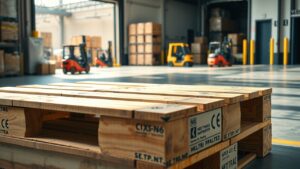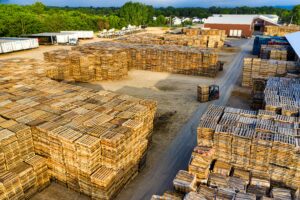The pallet industry in the Lower Mainland, Canada, is experiencing a technological transformation that affects the entire logistics and supply chain sector. Cities such as Vancouver, Surrey, and Burnaby are home to a diverse network of pallet suppliers, manufacturers, and distributors who are adopting innovative solutions to meet the growing demands of e-commerce, manufacturing, and retail industries. Modern pallet suppliers are leveraging automation, smart tracking systems, and eco-friendly practices to improve efficiency, reduce costs, and enhance the sustainability of their operations.
This blog will examine the key technological changes shaping the pallet industry, highlight sustainable practices, and explain how companies like AR Pallets are adapting to deliver high-quality solutions to businesses in the Lower Mainland.
Automation and Robotics in Pallet Manufacturing
Streamlining Production
Automated machinery is increasingly used to handle repetitive tasks such as sorting, stacking, and assembling pallets. Robotics systems improve production speed while ensuring consistency in quality. In larger facilities across Vancouver and Burnaby, automation reduces human error and minimizes workplace injuries associated with manual pallet handling.
Reducing Operational Costs
By integrating automated conveyors and robotic arms, pallet suppliers can significantly reduce labor costs and increase throughput. Automation also allows for greater scalability—companies can adjust production levels quickly in response to fluctuating market demands without overextending their workforce.
Smart Pallets: Revolutionizing Supply Chain Management
RFID and GPS Tracking
Smart pallets equipped with RFID tags and GPS trackers are transforming how suppliers monitor inventory and shipments. These technologies enable real-time tracking of pallets, ensuring goods reach their destinations safely. Suppliers in Surrey and nearby cities can now provide clients with up-to-the-minute data on pallet locations, improving transparency and reliability across the supply chain.
Predictive Analytics for Maintenance
The data collected from smart pallets can be analyzed to predict wear and tear, maintenance needs, and potential failures. This predictive approach reduces downtime, extends pallet lifespan, and lowers replacement costs. Companies adopting these technologies can also optimize pallet usage and route planning to improve overall operational efficiency.
Sustainable Practices in Pallet Production
Using Recycled and Renewable Materials
Sustainability is a growing priority for pallet suppliers. Many companies in the Lower Mainland now incorporate recycled wood or engineered materials into their products. Using reclaimed wood helps conserve forests and reduces landfill waste, contributing to a circular economy within the logistics sector.
Innovative Eco-Friendly Designs
New pallet designs focus on lightweight and modular structures, which minimize material usage while maintaining strength and durability. These designs not only improve transportation efficiency but also reduce fuel consumption and carbon emissions during shipping.
Pallet Pooling and Sharing Systems
Collaborative Networks
Pallet pooling allows multiple companies to share a standardized set of pallets, maximizing usage while minimizing costs. Collaborative networks make it easier to track and return pallets, enhancing operational efficiency for businesses in Vancouver, Richmond, and Burnaby.
Standardized Pallet Sizes
Standardization of pallet dimensions ensures compatibility across warehouses, trucks, and storage facilities. Consistent sizing reduces handling errors and simplifies logistics management, allowing suppliers to serve clients more efficiently and reliably.
Challenges for Pallet Suppliers
Investment in Technology
Adopting automation, smart pallets, and sustainable designs requires substantial investment in equipment, training, and IT infrastructure. Suppliers must carefully evaluate the cost-benefit ratio to ensure long-term profitability while staying competitive.
Data Security and Compliance
Smart pallets and IoT integrations involve collecting sensitive data, making cybersecurity a key concern. Suppliers must implement robust protection measures to safeguard client information and comply with privacy regulations.
Future Outlook: Innovation and Sustainability
The pallet industry in the Lower Mainland is expected to continue evolving as suppliers adopt more sophisticated technologies. Integration of AI-driven logistics, enhanced tracking, and advanced pallet designs will provide businesses with higher efficiency and reduced operational costs. Sustainability initiatives, including recycled materials and modular designs, will remain a critical focus, ensuring the industry aligns with environmental expectations and regulatory requirements.
Collaboration among suppliers, warehouses, and manufacturers will also play a key role in shaping a smarter, more resilient supply chain ecosystem in Vancouver, Richmond, Surrey, and surrounding areas.
Reliable Solutions for the Lower Mainland
Reliable Pallet Supply You Can Count On
AR Pallets has established itself as a trusted pallet supplier across the Lower Mainland, delivering high-quality pallets to businesses in Vancouver, Surrey, and Burnaby. The company combines modern technology with sustainable practices to provide durable, eco-friendly pallets tailored to client needs.
AR Pallets LTD is located at 12213 Industrial Rd, Surrey, BC V3V 3S1, Canada, and can be reached at (604) 367-7884 or via email at info.arpallets@gmail.com. Their team ensures seamless delivery and support, helping local businesses optimize their supply chain operations while reducing environmental impact.





